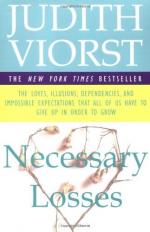
|
| Name: _________________________ | Period: ___________________ |
This test consists of 15 multiple choice questions and 5 short answer questions.
Multiple Choice Questions
1. In the anecdote about the holy man painting a portrait for a king, who ends up being revealed in the painting?
(a) The king.
(b) The king's wife.
(c) The holy man.
(d) The king's daughter.
2. What was the title of Delia Ephron's book about adolescent angst referenced in Chapter 10?
(a) Teen Infatuation.
(b) Romantic Teens.
(c) Puppy Love.
(d) Teenage Romance.
3. Henry David Thoreau's little isolated cabin was how far from his mother's house?
(a) One day on a horse.
(b) One mile.
(c) One state away.
(d) Ten miles.
4. Margaret Mead points out that we have labeled the Oedipal issue as a _______________.
(a) Valid response.
(b) Success.
(c) Ridiculous behavior.
(d) Negative.
5. According to Chapter 6, is sibling rivalry normal and universal?
(a) Only in industrialized nations.
(b) Ten out of ten psychoanalysts answer yes.
(c) Only in the United States.
(d) It depends on the parenting style.
6. What is the name of the philosopher who said, "Man is the being who is capable of becoming guilty and is capable of illuminating his guilt"?
(a) Friedrich Nietzsche.
(b) Dallas Willard.
(c) John Locke.
(d) Martin Buber.
7. When a mother rejects a child's need for dependence and pushes them out of the nest too soon, what can happen?
(a) We grow amazingly strong wings.
(b) We scream, or cry, or get angry.
(c) We crash to the ground.
(d) We adapt, or crumple, or compromise.
8. In the example of a woman dreaming of a German Nazi officer, she is really associating with what?
(a) Her cruel boss demanding she work overtime.
(b) The police man who gave her a ticket earlier in the day.
(c) Her overbearing mother urging her to eat in Yiddish.
(d) Her controlling husband forbidding her to go out.
9. Which fictional character mentioned in the book chooses not to become a man, and stay as a boy forever?
(a) King Arthur.
(b) Peter Pan.
(c) Robin Hood.
(d) Saint George.
10. Viorst states that what kind of parents are sexually attracted to their child?
(a) Normal parents.
(b) Degenerate parents.
(c) Same-sex parents.
(d) Adoptive parents.
11. Subliminal messages of "Mommy and I are one," have proven to result in what?
(a) Warm, fuzzy feelings.
(b) Higher achievements.
(c) Great anxiety.
(d) Spontaneous smiling.
12. During the age of latency, fear, anger, and harsh conscience make it difficult to do what?
(a) Maintain a good relationship with our parents.
(b) Develop into our own person.
(c) Concentrate on school.
(d) Make the break from our parents.
13. What is the name of the personality that evolves when a child cannot trust their own feelings and takes on the personality traits of others?
(a) "Borderline personality."
(b) "Shifting personality."
(c) "As-if personality."
(d) "Chameleon personality."
14. What was the name of the "weird little novel" mentioned by Viorst in Chapter 8?
(a) The Moviegoer.
(b) The Men's Club.
(c) Confederacy of Dunces.
(d) The Catcher in the Rye.
15. Which of the following, according to the author, may be an inappropriate way to deal with the grieving of childhood?
(a) Driving recklessly.
(b) Drugs.
(c) Sex.
(d) Breaking the rules.
Short Answer Questions
1. Even as adults, according to the author, we still view our mothers as what?
2. According to Art Buchwald, what are "the three worst words in the language"?
3. What are the ingrained patterns repeated in adulthood due to childhood experiences called?
4. As a result of unconscious guilt, criminals sometimes do what?
5. What is composed of our noblest goals?
|
This section contains 570 words (approx. 2 pages at 300 words per page) |

|




